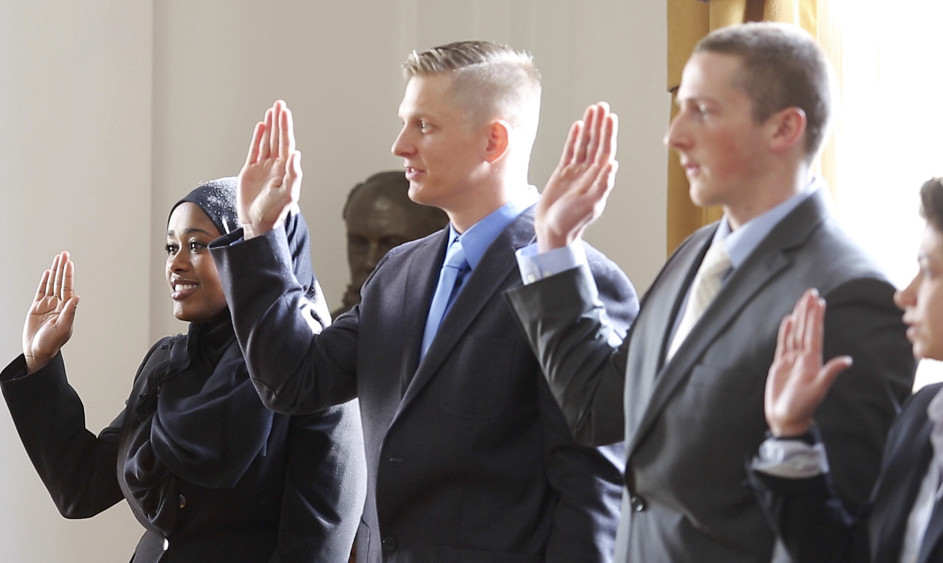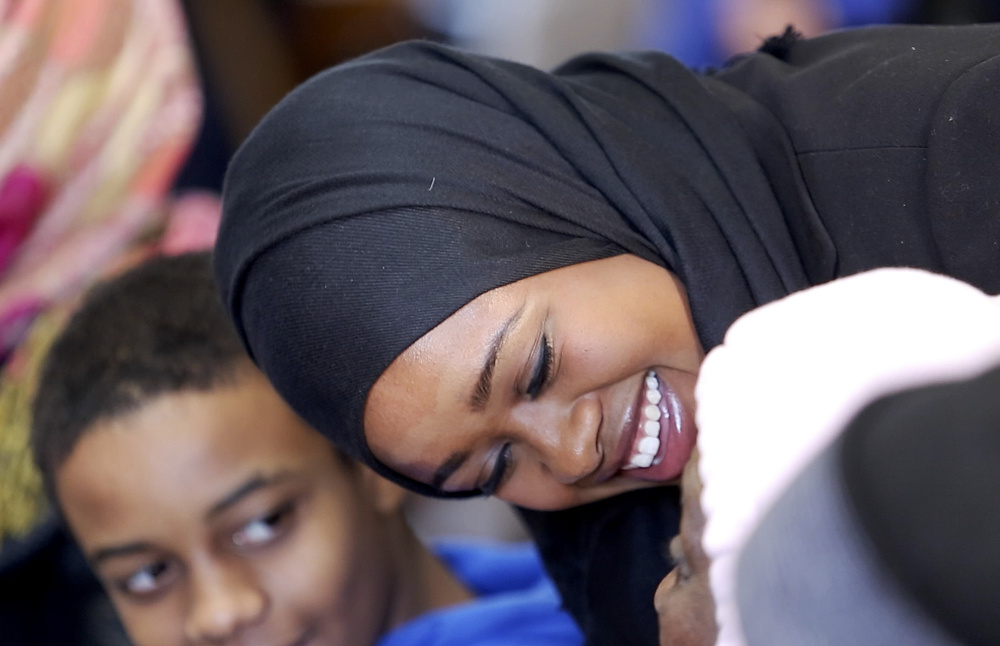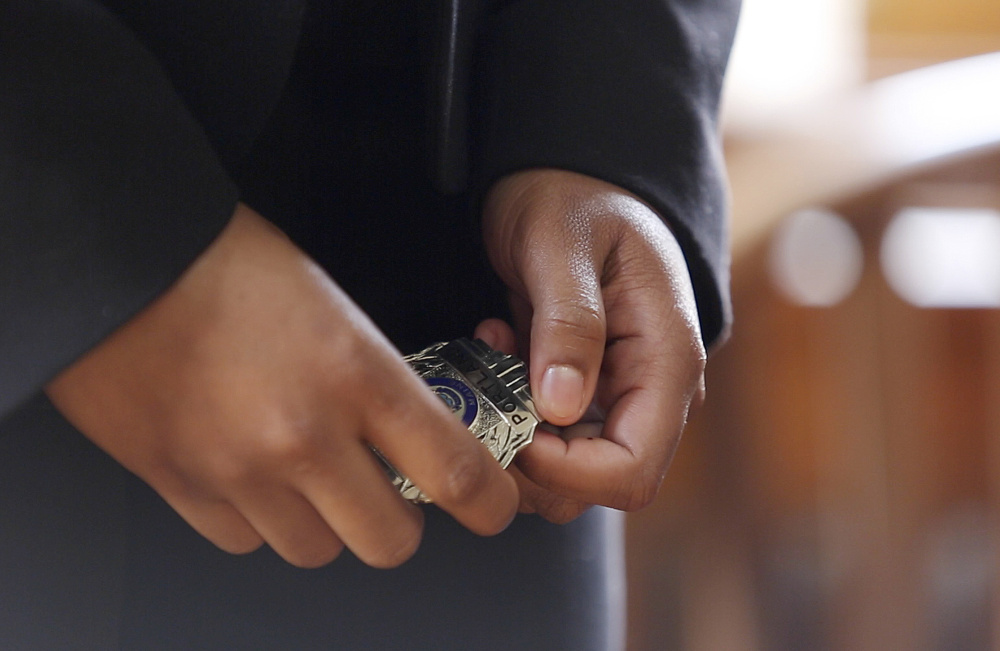When she played as a child, Zahra Abu always imagined herself the sheriff, arresting bad guys.
The fact that she was born to Somali parents in a Kenyan refugee camp, then raised in Portland, didn’t dampen her enthusiasm – but it may have contributed to her drive.
After years of hard work, including earning a bachelor’s degree from the University of Southern Maine in three years while working two jobs, Abu became a first: She was sworn in Friday as a Portland police officer.
A large segment of Maine’s Somali community and other immigrants, still uncertain how they fit in their new home, are celebrating the appointment of the state’s first Somali police officer.
“This is history for us,” said Fatuma Hussein, executive director of United Somali Women of Maine, who could barely contain her enthusiasm. Abu is “young, energetic. She stands for a lot of youth, who really deserve the opportunities such as that and I think she’s going to pave the way for many girls, women, boys and men in our community.”
Maine’s police departments are becoming more diverse. The most recent Maine Criminal Justice Academy class included three graduates – from Portland police, Auburn police and the Cumberland County Sheriff’s Office – for whom English is not their first language.
The police department in Lewiston, which also has a large Somali community, has been recruiting heavily to attract officer candidates from that group, though none has yet been hired.
‘WE WILL ONLY HIRE THE BEST’
Portland Police Chief Michael Sauschuck said Abu has a different background from many in the department, but she went through the same process as everyone else to become an officer.
“There’s no question that we want to be as diverse as our communities, but we will only hire the best, and I do believe she is one of them,” he said. “I hire good human beings and then we make police officers from them.”
Sauschuck welcomed five new officers, including Abu, to the department during a ceremony Friday at City Hall. All five had to pass a rigorous series of physical and psychological exams representing a variety of life experiences.
“I’m very excited, a little nervous,” Abu said Friday before the ceremony. “I feel very grateful for this opportunity. … I like helping people.”
Also sworn in was Darrel Gibson, who is from Ohio. He studied to be a firefighter and emergency medical technician and is now getting his bachelor’s degree in religion and theology from Liberty University. He also competes in mixed martial arts.
Concetta Puleo is from Long Island, New York, and worked as an insurance agent in Manhattan before moving to Maine and becoming a police officer.
David Moore was raised in Newport, where he was home-schooled through 12th grade and later became an emergency medical technician and studied justice at the University of Maine at Augusta.
Ben Savage is from South Portland and graduated magna cum laude from Thomas College in Waterville. He is a former member of the Scarborough Police Explorers, a group for youths who are interested in law enforcement. He was a Portland police cadet for two summers.
FAMILY EMPHASIZED EDUCATION
Abu, 22, the youngest of nine children, moved to Portland when she was 2. She earned a Girl Scout Gold Award, the equivalent of the Boy Scouts’ Eagle Scout award. She graduated from Deering High School in 2011. While studying criminal justice and women-and-gender studies at USM, she worked in loss prevention for Kohl’s department store in Westbrook and was a full-time case manager for Maine Immigrant & Refugee Service (MIRS).
She considered studying law, but her brother, Ilyas Munye Abu, a police officer in Worcester, Massachusetts, talked her into pursuing an internship with the Maine State Police instead.
“I told her it’s very rewarding when you go home to your family and can say you helped people,” he said.
Her father, Munye Munye, said he is proud of his daughter, because her path may have been difficult but she followed her ambition.
Abu is athletic, as well as calm, reserved and respectful, said her oldest brother, Mohamed Abu, 49, a computer engineer. He said the family is proud of his sister, who they say is the nation’s second Somali police officer.
Abu still has work to do before she can wear the badge that was presented to her Friday. She and other recruits from around the state must complete an 18-week training program before they can become full-time municipal police officers.
Abu’s sister Samira, 29, a social worker, said her family always has emphasized education, and all the children have attended college.
“One of the things our parents kind of nailed into our brains was, ‘You’re here for a reason. You need to take advantage of the education that is provided for you,'” she said.
Abu wore a hijab to her swearing-in, but won’t wear one when she’s patrolling the city’s streets.
“I don’t plan on wearing the hijab every shift just because it can become a hazard,” she said. “If you get in a scuffle, someone can decide to choke you with it. … I don’t need my hijab for everyone to know I’m Muslim and I’m Somali. That’s always going to be in my heart.”
ROLE MODEL
Abu’s appointment gives immigrants a sense of belonging and a sense of ambition, said Hussein, of the United Somali Women of Maine. Abu will be a role model and an important liaison with law enforcement, she said, someone who speaks Somali and understands the culture.
“She is the symbol of creating a trust relationship, bringing our community closer to law enforcement. I think she is the symbol of building bridges and forging relationships,” Hussein said. “She will be getting a lot of phone calls. She needs to be ready for that. She’ll be getting knocks on her door.”
Reza Jalali, multicultural student affairs coordinator for USM, said Abu’s accomplishment resonates on a number of levels.
“It’s wonderful for the entire new Mainers community because they need role models. They need to feel that they belong and are included, and that this is their country as well and their community as well,” he said.
Abu also is breaking down barriers for other women.
“She’s shattering some kind of ceiling and stereotypes and barriers that her own community has,” Jalali said, referring to how some traditionalists don’t approve of women pursuing roles that are seen as more appropriate for men.
“Now maybe some girl wants to be chief of police, attorney general,” he said. “That’s how it starts.”
Hussein concedes that it is unfair to put such a burden on one person, carrying the aspirations of so many people. But it is the inescapable price of being a leader.
“You will have many immigrants graduating from college that will look into law enforcement because she made that bold move for them. She laid the foundation,” Hussein said. “She has made history. Nobody can take that away.”
Correction: This story was updated at 9:55 a.m. on 1/9/16 to correct Zahra Abu’s place of employment.
Comments are not available on this story.
Send questions/comments to the editors.




